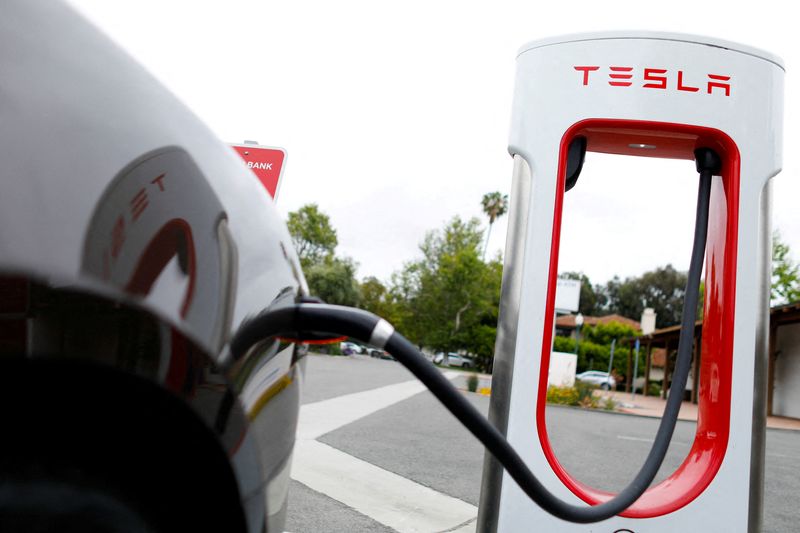Investing.com -- Tesla (NASDAQ:TSLA) and Netflix (NASDAQ:NFLX) shares fall, weighing on the Nasdaq, following the latest earnings from the big-name tech brands. Meanwhile, the parade of quarterly results in the U.S. marches on, and Apple (NASDAQ:AAPL) reportedly becomes the latest contender in the race to develop generative artificial intelligence (AI) technology.
1. Tesla margins fall; Netflix revenue disappoints
Shares in Tesla and Netflix both dropped in premarket trading as investors digested mixed second-quarter results from the electric carmaker and the streaming giant.
For Tesla, attention centered around recent price cuts to boost volumes and combat intensifying competition in the electric vehicle market. The decision pushed revenues up to a record high of $24.93 billion during the three-month period.
But the move also weighed on its gross profit margin from automotive operations, excluding the impact of regulatory credits, which dropped to 18.2% from 18.8% in the first quarter and 26.2% last year. Although that decline was not as large as many analysts had expected, Tesla's stock still slumped after chief executive Elon Musk later suggested that more price reductions could be coming this year.
Meanwhile, Netflix's crackdown on password sharing between users appears to be working, with the company adding 5.9 million subscribers in the quarter, far above Wall Street estimates. It also told analysts that the number of canceled accounts was "low."
However, this trend was overshadowed by softer-than-anticipated revenue of $8.2B. Netflix's third-quarter projection of $8.5B for the top-line figure missed forecasts as well. Shares in Netflix tumbled as a result.
2. Nasdaq futures slump
Futures for the Nasdaq pointed lower on Thursday as results from Tesla and Netflix weighed on the broader tech sector.
At 05:14 ET (09:14 GMT), Nasdaq 100 futures shed 141 points or 0.88%, pulled lower by an after-hours decline in shares of the two major tech players that extended into premarket trading.
S&P 500 futures also edged down by 9 points or 0.20%, while Dow futures added 31 points or 0.09%.
The broad-based Dow Jones Industrial Average posted its eighth consecutive session of gains on Wednesday, its longest winning streak since 2019. Meanwhile, the benchmark S&P 500 climbed 0.24% and the Nasdaq Composite inched up 0.03%.
3. Johnson & Johnson, American Airlines highlight busy earnings day
A fresh batch of U.S. corporate earnings is scheduled to be released Thursday, with health care behemoth Johnson & Johnson (NYSE:JNJ) and carrier American Airlines (NASDAQ:AAL) among the biggest brands to report.
Insurer Travelers (NYSE:TRV), investment manager Blackstone (NYSE:BX), tobacco group Philip Morris International (NYSE:PM), and regional lender Fifth Third Bank (NASDAQ:FITB) also feature on the results calendar.
Earnings have largely been stronger-than-expected during this latest earnings season, fuelling hopes that this could be a sign that the U.S. economy may be able to engineer a soft landing after a series of aggressive Federal Reserve interest rate hikes. According to FactSet data cited by CNBC, three-quarters of the firms that have already reported beat Wall Street estimates.
4. Apple testing ChatGPT rival - Bloomberg
Apple is developing a new generative AI program to compete with the likes of OpenAI's ChatGPT and Google's Bard, according to Bloomberg News.
Workers at the tech giant have already constructed a framework, known as "Ajax," the report said, citing people familiar with the matter. A chatbot dubbed "AppleGPT" is also being tested.
Shares in Apple touched a fresh record high on the report, while peers such as Microsoft (NASDAQ:MSFT), Nvidia (NASDAQ:NVDA) and Google-owner Alphabet (NASDAQ:GOOGL) dropped.
California-based Apple, which has stayed relatively quiet on the subject of AI despite a surge in the technology's popularity this year, did not respond to a request for comment from Reuters.
5. TSMC pessimistic on hopes for AI-driven boost in chip demand
Taiwan Semiconductor Manufacturing Co (TW:2340) (NYSE:TSM) -- also known as TSMC -- posted second-quarter earnings that topped estimates, but the world's biggest contract chipmaker poured cold water on expectations that the boom in AI interest will fuel a surge in chip demand.
Net profit at TSMC in the three months to June 30 tumbled by more than a fifth to 181.80B Taiwan dollars, although this was still above expectations of analysts polled by Refinitiv.
But, in a post-earnings webcast, chief executive C.C. Wei flagged that the rush into AI may not be long-term or sustainable. He noted that "[while] we have recently observed an increase in AI-related demand, it is not enough to offset the overall cyclicality of our business."
TSMC subsequently slashed its annual revenue guidance, saying it expects the figure to slip by 10% in 2023 versus its previous outlook for a single-digit drop. U.S.-listed shares in TSMC were lower in premarket trading Thursday.
The move stood in contrast to bullish comments earlier this year from the chip industry from Nvidia, one of TSMC's largest customers. Nvidia previously forecast a jump in semiconductor demand later this year, citing the need for computing parts to power AI programs.
